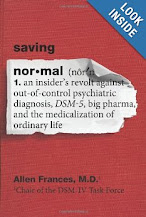Before Mental Health Awareness Month draws to its nonconsequential end --
Allen Frances
New York Post has published a new interview with Allen Frances about how bad it is to receive a diagnosis, or as he puts it, become a mental patient.
Become a mental patient?
Some background: Allen Frances is a professor emeritus of psychiatry and behavioral sciences at Duke University. His fields of research were wide ranging, including personality disorders, chronic depression, anxiety disorders, schizophrenia, AIDS, and psychotherapy. [Note: not autism]. He served as the chair for the DSM (Diagnostic and Statistical Manual of Mental Disorders) task force, which published the DSM IV in 1994. He later became the chief critic of the DSM 5, which is a modest revision of his work.
As part of Frances's critique of the DSM 5, he wrote Saving Normal, subtitled An Insider's Revolt against Out-of-Control Psychiatric Diagnosis, DSM-5, Big Pharma, and the Medicalization of Ordinary Life. His book was published one week before the DSM-5. Since then he has continued the themes of the subtitle.
In addition to my review of his book linked above, I have commented a few times on Frances's statements. I appreciate his concerns about Big Pharma's influence in the treatment of mental illness and inappropriate use of medication, especially in the case of mild depression. His periodic attempts to save normal, not so much.
A couple quotes from his New York Post interview:
Dr. Allen Frances told The Post that he is “very sorry for helping to lower the diagnosis bar.”
Now, Frances said, he fears his work “contributed to the creation of diagnostic fads that resulted in the massive over-diagnosis of autistic disorders in children and adults.”
Stigma Against Mental Illness
One of the themes of Saving Normal is that diagnosis exposes people to stigma. So it would be worrisome to him that so many people are now mental patients, newly exposed to stigma.
I'll grant Francis this point. Prejudice against mental illness is alive and well - and particularly dangerous when it is expressed in the medical field.
There is scant evidence that Stamp Out Stigma campaigns have moved the needle, except on the issue of depression. Judging by news reports, prejudice against people with mental illness has been growing.
- Police killings of people with mental illness are routinely excused.
- Recently, an ex-Marine is lauded as a hero after putting Jordan Neely, a disturbed man on a New York subway, into a choke hold for fifteen minutes. In two days Daniel Penny raised over $1.5 million for his defense against a charge of second degree manslaughter.
- As politicians regularly blame mass shootings on mental illness, they also routinely reduce funding to address it.
The thing is, prejudice against difference does not stem from diagnosis. It stems simply from difference itself.
A Diagnosis of Autism
In the case of autism, let me suggest an alternative to Francis's view.
From the anecdotal evidence of many people finally diagnosed in adulthood, the diagnosis brings not stigma but relief. They had already been stigmatized throughout childhood. Not by a psychiatric diagnosis, but by the schoolyard diagnosis weird and the classroom diagnosis behavior problem. They grew up being bullied and punished because they were not normal - to use Dr. Francis's favorite word.
Underserved Children with Autism
Black children were 30% less likely to be identified with ASD-N compared with white children. Children residing in affluent areas were 80% more likely to be identified with ASD-N compared with children in underserved areas.
The consequence of under-diagnosis is that, while rich white kids get services, poor black kids get placed in the school to prison pipeline.
There are real life consequences to under-diagnosis. Poor black kids should not have to pay the cost for Allen Frances's hobby horse.








Addiction Treatment Nashville: Comprehensive addiction treatment in Nashville includes personalized plans that may involve detox, counseling, and aftercare support.
ReplyDeleteMany rehab centers utilize cognitive-behavioral therapy to change negative thought patterns.
ReplyDeleteAs the opioid epidemic continues to affect communities across the United States, New Jersey has emerged as a critical area for addressing substance use disorders. With a growing number of individuals struggling with addiction, drug rehab facilities in the state provide essential support and treatment options. This article explores the various drug rehab programs available in New Jersey, their approaches to treatment, and resources that can guide individuals toward a successful recovery.
ReplyDeleteThhis is awesome
ReplyDelete